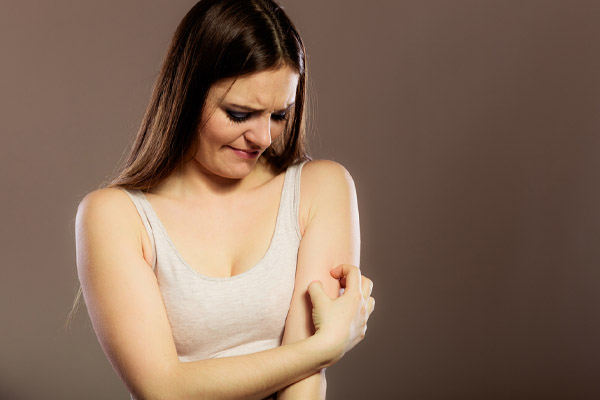
HVAC systems regulate the temperature in your home. They also ensure that the indoor humidity is at a balanced level. Most homes become too cold in the winter, too hot in the summer, and very muggy. You can be sure that your air conditioner or heater can keep your home comfortable and habitable. However, you can’t always trust it to be gentle on your skin. HVAC and skin issues go hand in hand. This is especially true in homes equipped with central, forced-air heating systems, such as air conditioners, furnaces, and heat pumps. This article discusses how using your HVAC system may affect the health, look, and overall integrity of your body’s protective barrier.
HVAC and Skin Issues: What You Should Know
Read on to learn about several of the top skin problems homeowners encounter.
Excessive Drying
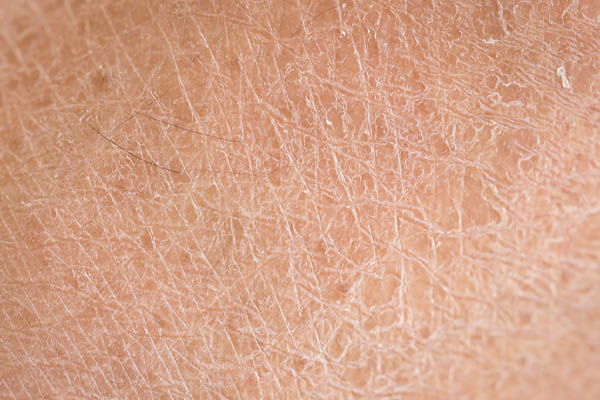
If your skin is dehydrated during the winter, you probably think it is due to the cold, dry outdoor conditions. However, your heating system, which is drying your nose and blocking your sinuses, may also be drying your skin. If your heater causes occasional nighttime nosebleeds, it could damage your skin too.
Unlike the radiant heat radiators and boilers generate, warm air from furnaces dries out the indoor moisture, like how a clothes dryer, hair dryer, and open stove do. The bad news is that furnaces don’t have features or functions that add moisture back into structures when too much is lost. Insufficient indoor humidity is the most likely reason if you have dry, cracked lips or hands or recurring eczema problems. Consult your HVAC contractor about installing a whole-house humidifier.
Dramatic Temperature Changes & Red, Ruddy Complexions
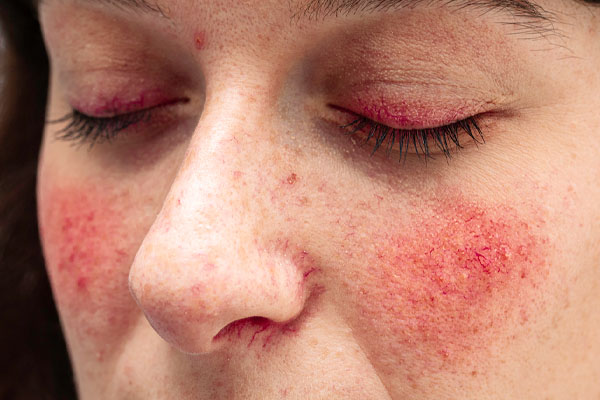
Modern humans are conditioned to stay in relatively static environments. You are probably in a space close to 70 degrees Fahrenheit, whether at home or work. Going outside into sweltering or freezing temperatures may come as a shock. It is almost unbearable to wait for your air conditioner to kick in when the seats, steering wheel, and seatbelts are hot or sit inside your cold car before your heater comes on. An internal thermostat not acclimated to change can make it feel like slight temperature increases or decreases are a big deal.
This and other reasons may mean moving from extremely cold or hot spaces into a more moderate indoor climate can cause your face to look red and rosy. In some situations, having a slightly flushed face may look aesthetically appealing, but it indicates fast-dilating blood vessels and may be a precursor to rosacea or eczema. Building your tolerance to temperatures that are a bit warmer or cooler than the norm can help protect your skin. This lets you maintain your home’s temperatures that aren’t shockingly different from the outdoor temperature.
Excess Moisture & Skin Rashes
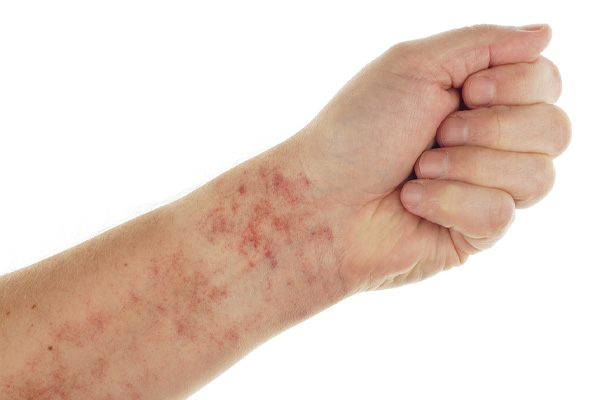
Aside from making the indoor air excessively dry, your HVAC system can cause other skin issues. A poorly maintained or incorrectly sized air conditioner for the service area can leave you with excess moisture indoors. This is likely the reason why you have a cool home when the AC is on, but the air still feels clammy or muggy.
Too much moisture can cause clogged pores, acne breakouts, skin rashes, and more. The solution can be as easy as replacing your HVAC air filter. However, if you have a large family who takes hot showers often and cooks a lot of steamy recipes, your air conditioner may not be able to handle humidity regulation. Discuss this with your HVAC technician because they can recommend the best solution for your unique situation. For instance, some techs can recommend installing a whole-house dehumidifier.
Decreases in the Natural Production of Oil
Excessively dry indoor air can impact the way your skin cares for itself. If your space is constantly too dry, your skin will generate much less oil. This can cause premature skin aging as it hastens the fine lines and wrinkles formation.
How to Stop Your HVAC System From Negatively Affecting Your Skin

During winter, staying hydrated is one of the best skin protection against the damage of high indoor heat. Limit your caffeine intake and drink lots of water. Eat water-dense, vitamin-rich foods such as fresh fruits and vegetables. This help boosts your skin’s health with powerful antioxidants and phytonutrients.
Use heavier skin creams in the summer instead of lightweight, water-based moisturizers. Search for products rich with natural moisturizing agents like shea butter, cocoa butter, coconut oil, and aloe vera. Make sure that you apply skin cream liberally before going to sleep.
It is also essential to mitigate HVAC-linked concerns directly affecting your skin. Regardless of the temperature outside and how hard your HVAC system runs, indoor humidity should always be balanced.
Streamlining Your Home’s Envelope
Humidity problems may be linked to how tight your home’s envelope is instead of your HVAC system. Your home’s envelope is how airtight it is. If you are not receiving sufficient natural airflow or mechanical ventilation because of factors like insufficient attic ventilation, your home could be too dry or too moist.
Changing Your HVAC Air Filter
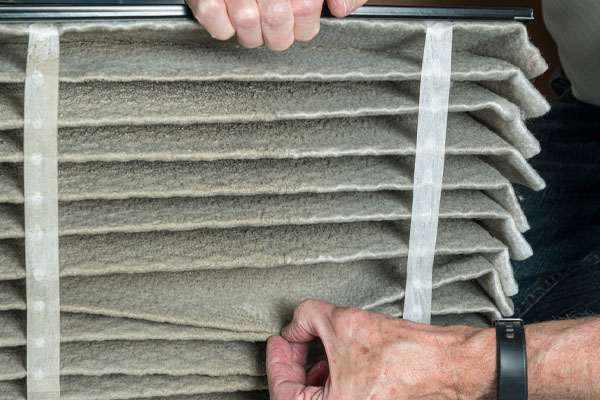
Not changing your HVAC air filter can cause your system to work harder to do its job. The first performance area that fails will probably be humidity regulation and removing indoor air particulates like dust from your home. Ensure that you replace the air filters every one to three months. Homes have different filter replacement frequencies. It is a good practice to check it monthly and replace it as needed.
Lower Your Thermostat
Find a moderate thermostat setting for the winter and stick to it. Increasing the temperature in your unit as high as possible will only drive up your energy bills, cause dry, unhealthy-looking skin, and stress out your nasal passages and sinuses. A lower and more appropriate thermostat setting will also keep your face from becoming flushed and bright red when coming in from the outside cold or heat.
Consider Installing Integrated HVAC System Accessories
Think about installing whole-house dehumidification or humidification equipment. Your skin will greatly benefit when you establish and maintain the right indoor moisture level. It will create a more comfortable living environment, enhance indoor air quality, and reduce the chances of acquiring mold problems. Whole-house humidifying and dehumidifying equipment can be seamlessly integrated with your existing HVAC unit.
Conclusion
Using your HVAC system should not cause severe reactions on your skin. However, setting the thermostat too high, having too much or too little humidity, or failing to conduct basic system upkeep can cause your skin to be drier than usual. You also become more likely to develop problems like acne, eczema, and rosacea, and experience accelerated aging.
Call Point Bay Fuel For All Your HVAC Needs

For top-quality HVAC services in Ocean and Monmouth Counties, New Jersey, don’t hesitate to contact Point Bay Fuel. We employ the best professionally certified technicians, and they can perform excellent heating and cooling replacements, installations, repairs, and maintenance. Each of our reliable techs has years of experience and extensive knowledge to service your HVAC system correctly.
Point Bay Fuel guarantees the most affordable HVAC service prices in the locality. Our tune-up services can increase your energy efficiency and enhance your comfort while lowering your home heating and cooling bills. When you need to replace or repair your HVAC system, we can recommend the best one for your home within your budget. Your satisfaction is our priority, so we back all of our work with a guarantee. Give Point Bay Fuel a call today to schedule a service appointment. We offer free, in-home estimates.
Contact us now by calling (732) 349-5059 to speak to one of our home comfort specialists! Click the link to view our service area.
The post How Does Your HVAC Affect Your Skin? appeared first on Point Bay Fuel.
No comments:
Post a Comment